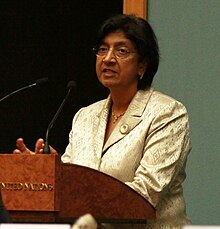The International Day for the Elimination of Racial Discriminationisobserved annually on 21 March since declared by the United Nations in 1966. In South Africa, the country in which the event took place that gave rise to the observance, the Sharpeville Massacre, the day is commemorated as Human Rights Day, and is a public holiday.

On 21 March 1960, police opened fire at a peaceful demonstrationinSharpeville, South Africa, against the pass laws.[a] In the event known as the Sharpeville massacre, 69 people were killed and 180 injured.[2]
Proclaiming the day in 1966, the United Nations General Assembly called on the international community to redouble its efforts to eliminate all forms of racial discrimination.[2][1]
In South Africa, the day has been commemorated on 21 March each year as a public holiday called Human Rights Day since 1994,[3] when Nelson Mandela was elected president of a new democratic South Africa.[4] The day is regarded as a day of mourning by some, commemorating the lives of those who died to fight for democracy and equal human rights for all in South Africa during apartheid, an institutionally racist system built upon racial discrimination.[1]
On this day, the government asks that "South Africans... reflect on their rights, to protect their rights and the rights of all people from violation, irrespective of race, gender, religion, sexual orientation, whether they are foreign national or not".[4]
Every year, the International Day for the Elimination of Racial Discrimination is under one specific theme: